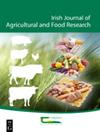过渡时期:爱尔兰食品行为的变化以及2019冠状病毒病大流行的潜在影响
IF 0.9
4区 农林科学
Q3 AGRICULTURE, MULTIDISCIPLINARY
引用次数: 4
摘要
随着时间的推移,消费者的食物选择决策通常相对稳定;由于出于效率原因,消费者进行习惯性决策的频率很高。因此,习惯是饮食行为的有力预测因素。然而,个人生活或外部环境的变化可以导致对食物选择动机的更有意识的考虑,并转变为适应新环境的新行为模式。本文研究了2019冠状病毒病(新冠肺炎)大流行,将其视为背景变化如何影响食物选择轨迹的一个特别有用的案例。根据对爱尔兰651名食品消费者的在线调查结果,它调查了食品规划、购物、准备和饮食行为,包括储存和对决策的影响。总体而言,它发现了向新的行为模式转变的重要证据,确定了两个不同的集群——“新冠肺炎应对者”和“不安的限制者”。对于这两组人来说,购物体验都变得紧张,导致购物频率降低,计划水平提高。相反,与烹饪相关的时间压力减少了,这种活动带来了乐趣。这也反映在储存行为上;爱尔兰最有可能储存的前三种食物是意大利面/米饭、鸡蛋和面粉,这反映出该国在疫情期间渴望烘焙和烹饪。这些行为是在新出现的供应链参与者应对措施的背景下讨论的,确定了未来战略决策的考虑因素,以及公共卫生营养干预的一些机会。本文章由计算机程序翻译,如有差异,请以英文原文为准。
A time of transition: changes in Irish food behaviour and potential implications due to the COVID-19 pandemic
Consumers’ food choice decisions are generally relatively stable over time; consumers engage in habitual decision-making due to the high frequency of such decisions for efficiency reasons. As a result, habits are strong predictors of eating behaviour. However, changes in the life of the individual or the external environment can result in more conscious consideration of food choice motives and a transition to new patterns of behaviour to fit the new context. The coronavirus disease 2019 (COVID-19) pandemic is examined in this paper as a particularly useful case of how a change in context affects food choice trajectories. Drawing on results from an online survey of 651 food consumers in Ireland, it examines food planning, shopping, preparation and eating behaviour, including stockpiling and influences on decision-making. Overall, it finds significant evidence of a transition towards new patterns of behaviours, with two distinct clusters identified – the “Covid copers” and the “restless restrictors”. For both groups, the shopping experience has become stressful resulting in reduced frequency of shopping and higher levels of planning. Conversely, time pressures related to cooking have reduced, with enjoyment associated with such activities. This is also reflected in stockpiling behaviour; the top three foods most likely to have been stockpiled in Ireland were pasta/rice, eggs and flour, reflecting the nation’s desire to bake and cook during the pandemic. These behaviours are discussed in the context of emerging supply chain actor responses, with considerations for future strategic decisions identified, along with some opportunities for public health nutrition interventions.
求助全文
通过发布文献求助,成功后即可免费获取论文全文。
去求助
来源期刊
CiteScore
2.50
自引率
20.00%
发文量
23
审稿时长
>36 weeks
期刊介绍:
The Irish Journal of Agricultural and Food Research is a peer reviewed open access scientific journal published by Teagasc (Agriculture and Food Development Authority, Ireland). Manuscripts on any aspect of research of direct relevance to Irish agriculture and food production, including plant and animal sciences, food science, agri environmental science, soils, engineering, buildings, economics and sociology, will be considered for publication. The work must demonstrate novelty and relevance to the field of research. Papers published or offered for publication elsewhere will not be considered, but the publication of an abstract does not preclude the publication of the full paper in this journal.

 求助内容:
求助内容: 应助结果提醒方式:
应助结果提醒方式:


